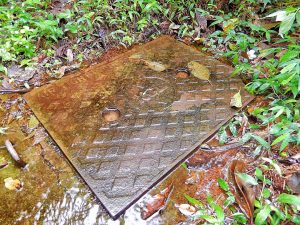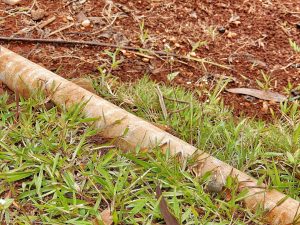This project is made possible through the partnership of Water Charity and the National Peace Corps Association. ![]()
Location
Kwizu Village, Same District, Kilimanjaro Region, Tanzania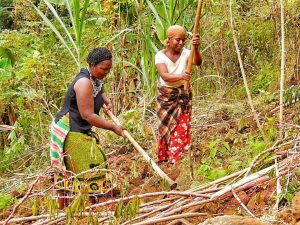
Community Description
The village of Kwizu is located high in the Southern Pare Mountains, approximately 1,710 m (5,605 ft) in elevation. Around 2,000 villagers make their home here within the steeply sloping, intensely wooded mountains. Their primary occupations are farming, with corn, beans, and sugarcane being the main crops, and animal husbandry of cows, chickens, and sheep. Trees are varied and highly abundant, with an emphasis on deciduous species, and local farms are built within and around these forests.
There are two different forests within the village of Kwizu, one is a managed forest (msituwabiashara) and the other is a reserve forest (msituwaasili). The managed, or ‘business’ forest is used primarily for wood-cutting, farming, and homesteading, while the reserve forest has been set aside by the government to transition into Mkomazi National Park in the lowlands.
Water sources come from any one of three rain-fed upland springs. Because of this, water tends to be more available during the rainy season and a considerable problem during the dry season.
Problem Addressed
In Kwizu village, access to water is challenging for most villagers. There are no tanks, local water sources are very far walked, and most water taps are in poor condition. Further, some areas in the village do not have any nearby water taps and women and children must walk long distances to collect water, usually up to one kilometer.
Of the areas where taps are present and in working conditions, water only flows to them 6 months of the year or less, and because of distances from the source only about 40% of those actually receive any water during these times. Furthermore, water access issues discourage student attendance at schools since many youths are required to walk long distances to fetch water for the family in the mornings and then must travel 45 minutes to 2 hours to reach school. With this strain, students often arrive late, which is a provocation for corporal punishment, or they may choose not to go at all. In addition to students, older women also suffer from carrying water long distances, oftentimes carrying a baby on their backs or another burden in their hands, such as corn or leaves to feed cows, thus exacerbating existing health issues and/or creating new ones.
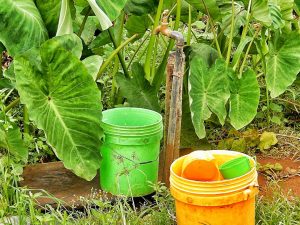 A lack of available water resources also influences nutrition and available food products. Currently, there are only two vegetable gardens in existence and Kwizu village does not have its own market. This combination means that in order for villagers to acquire dietary variety beyond corn products and beans, they must travel by foot anywhere from one to five hours each way, every week or else pay 10,000 TSH (round trip) to go to town for foodstuffs. Increasing water availability in the village will enable villagers to create more household gardens, and perhaps in time, fish ponds or even their own village market.
A lack of available water resources also influences nutrition and available food products. Currently, there are only two vegetable gardens in existence and Kwizu village does not have its own market. This combination means that in order for villagers to acquire dietary variety beyond corn products and beans, they must travel by foot anywhere from one to five hours each way, every week or else pay 10,000 TSH (round trip) to go to town for foodstuffs. Increasing water availability in the village will enable villagers to create more household gardens, and perhaps in time, fish ponds or even their own village market.
Project Description
To address the water challenges present in the community, we plan to build five water tanks dispersed throughout the village to improve access and availability.
The tanks will vary in size depending upon how many villagers they will serve. Of the six sub-villages within Kwizu, one tank will be placed within each of five of them. In Kionzogolo A, the central part of the village, we will place a 20,000 L tank, in Kionzogolo B we will place a 5,000 L tank, Kibengele will receive a 15,000 L tank, Nzoroko A, which also extends down the mountain to the secondary school and health clinic, will receive a 20,000 L tank, and in Nzoroko B we will build a 10,000 L tank.
In addition to building tanks, the main water source areas will be cleaned up. This will include maintenance around the water intake areas as well as cleaning the nearby environment and planting trees to encourage greater water storage for the future. A price estimate has been secured from an experienced tank builder who will oversee the hiring of multiple other builders within the village. The work will be spread out to many villagers to speed up the building process as well as to spread out the income generated from the project. The majority of needed supplies will be purchased in the Same, the nearest banking town to Kwizu, and transported up the mountain by either villagers or rented trucks.
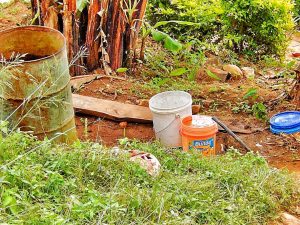 Villagers will contribute both time and cash money to the project. Cash money will be approximately 1,818,000 TSH (~$910) and will be raised from within the community. Each household has committed to contributing a small amount to raise the necessary funds; this process will be repeated again in the future for any maintenance or repairs.
Villagers will contribute both time and cash money to the project. Cash money will be approximately 1,818,000 TSH (~$910) and will be raised from within the community. Each household has committed to contributing a small amount to raise the necessary funds; this process will be repeated again in the future for any maintenance or repairs.
Activity-based contribution will total approximately 3,809,000 TSH (~$1,905). Activities the villagers propose to contribute include digging up and preparing each site, breaking down rocks from the surrounding landscape and carrying them to each site (both large and small), and carrying other bought supplies up from town to decrease transportation costs. Villagers will begin by collecting rocks as well as bringing up supplies to the sites as much as they are able to.
Water Charity funding will be used to purchase the remaining materials, and to pay the salary of the builders. At this point, the remainder of the supplies will be acquired from town, as well as some from stores within the village, and the builders will begin their work on the tanks simultaneously. Ideally, the whole process will take approximately three months.
Project Impact
This project will benefit approximately 2,200 people.
Peace Corps Volunteer Directing Project
Bethany Drahota
Monitoring and Maintenance
Project monitoring will be the responsibility of the water projects committee. This is a WUC-type group formed for the project. The head of the committee and Bethany’s village counterpart will be responsible for overseeing project implementation and following up with progress, although all committee members will participate. The committee has also assigned record keepers from within each sub-village to record outcomes, as well as any problems that may require maintenance. They will measure impacts and will review and maintain all documentation from the entire village. There is also one accountant who will be in charge of collecting and monitoring funds from within the village. The community has agreed to contribute a small amount from each household to ensure tank upkeep. The committee plans to meet 3-4 times per year to discuss impacts and any needed maintenance.
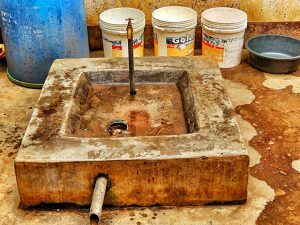 Comments
Comments
The community organization involved in this project is Kwizu Water Projects Committee. They have been instrumental in evaluating community needs and determining ways to fill them.
Upon arrival in Kwizu, Bethany was extremely impressed with how motivated the community was for change. Hearing from other volunteers the struggles they were having generating interest for projects, Bethany was pleasantly surprised when she met no such resistance here.
The idea for a water project was first initiated by the villagers. She was met at each site by a large gathering of enthusiastic men and women, eager to show her how they lived and answer all her questions. When she told them that to obtain funding, the community would need to contribute, there was a resounding yes, and it took less than 10 minutes to come up with enough activities to meet 25% of the requested funds.. Every step of the way, there has been much support and excitement. Bethany says she was blown away by the experience of setting this up and is very pleased to be a part of this project.
This project has been funded by an anonymous donor. Additional donations will go toward other projects in Tanzania.
This project has been completed. To read about the conclusion, CLICK HERE.
